To find a great flute teacher in your area, start by setting clear learning goals based on your interests and needs. Explore local music schools and online platforms for flexible options. Check qualifications, ensuring they have relevant music degrees or flute certifications. Reach out to current or former students for feedback, and consider attending local music events to meet potential teachers. Don't hesitate to schedule trial lessons to gauge compatibility. Additionally, discussing lesson costs and availability will help you balance your budget. There's more to uncover about making the best choice for your musical journey ahead.
Key Takeaways
- Define your learning goals to find a teacher who aligns with your specific objectives, whether for fun, band, or professional development.
- Research local music schools or online platforms for qualified flute instructors, considering their teaching methods and student engagement strategies.
- Check instructors' qualifications, including degrees in music, flute pedagogy certifications, and performance experience in your desired genre.
- Assess pricing and lesson frequency to ensure they fit your budget and commitment level for consistent learning.
- Attend local music events or workshops to connect with teachers and gain insights into their teaching styles and community involvement.
Determine Your Learning Goals
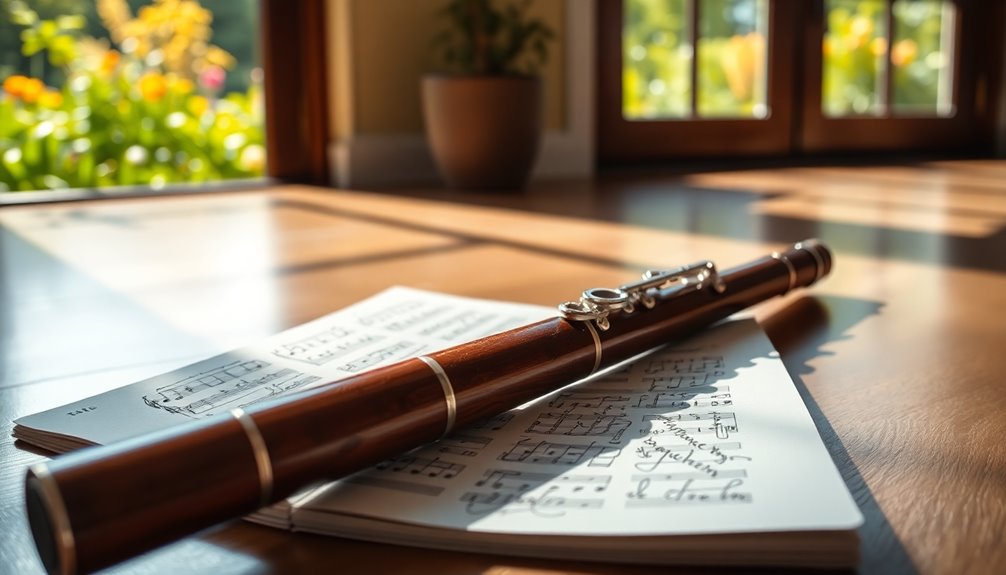
Setting clear learning goals is essential when searching for a great flute teacher. By defining what you want to achieve, you'll not only streamline your search but also enhance your personal motivation.
Think about whether you aim to play for fun, join a band, or pursue a professional career. Each goal requires different approaches and teachers.
Consider breaking your goals down into manageable steps. For instance, if you want to master classical pieces, you might focus on technique and tone quality first.
If improvisation excites you, seek a teacher who specializes in jazz and can guide you through the nuances of that style.
Writing down your goals can make them feel more tangible and inspire you to stay committed.
Share your aspirations with potential teachers; they can tailor their lessons to fit your needs, ensuring you feel supported and understood. Additionally, knowing whether you want to play a standard silver-plated flute can help teachers recommend the most suitable instruments for your learning style.
Research Local Music Schools
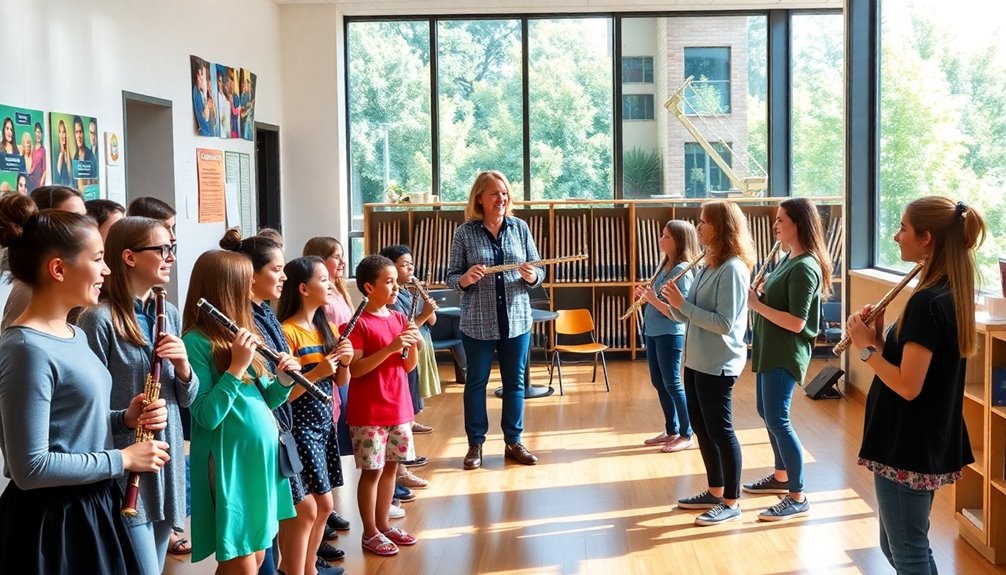
Researching local music schools can be a game-changer in your search for a great flute teacher. These institutions often provide a wealth of resources and opportunities that can enhance your learning experience.
Here are some benefits of checking out local music programs:
- Qualified Instructors: Many schools employ experienced teachers who specialize in flute instruction.
- Structured Curriculum: You'll find well-organized lessons tailored to different skill levels.
- Flute Workshops: Participating in workshops can give you hands-on experience and valuable feedback.
- Community Connections: You'll meet fellow musicians and expand your musical network.
Additionally, some music schools may offer performance-enhancing tools that can further aid your practice and development as a flutist.
Explore Online Teaching Platforms

If you're looking for flexibility and convenience in your flute lessons, exploring online teaching platforms can be a fantastic option. With a variety of online resources available, you can connect with skilled instructors from around the globe without the hassle of commuting.
Virtual lessons let you learn at your own pace, fitting perfectly into your busy schedule.
When you choose online platforms, you'll find an array of teaching styles and methods. Whether you're a beginner or an advanced player, there's a teacher out there who can meet your unique needs.
Many platforms offer trial lessons, allowing you to experience a session before committing. This is a great way to find a teacher whose approach resonates with you.
Additionally, online communities often accompany these platforms, giving you a sense of belonging. You'll have the chance to interact with fellow flute enthusiasts, share tips, and celebrate each other's progress.
Embracing these virtual lessons opens up a world of opportunities, making it easier than ever to enhance your flute skills while building connections with others who share your passion. Furthermore, incorporating practice tools and feedback from various apps can significantly augment your learning experience.
Check Qualifications and Experience
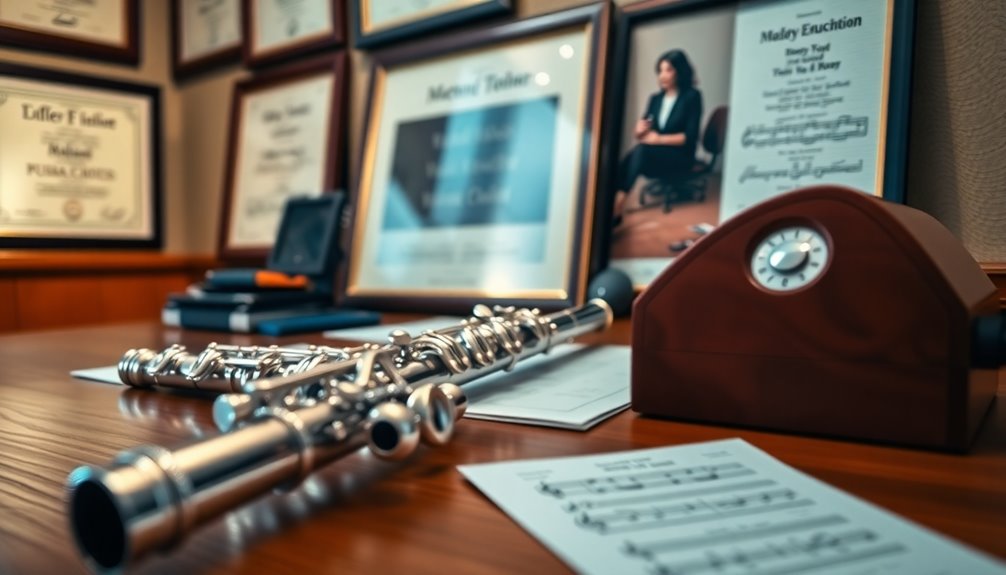
After you've explored various online teaching platforms and found potential flute instructors, the next step is to check their qualifications and experience.
You want a teacher who not only understands music theory but also has practical knowledge. Here are some key points to take into account:
- Teaching Credentials: Look for formal qualifications, such as degrees in music or certifications in flute pedagogy.
- Performance Experience: A teacher with a strong background in performance can offer valuable insights into interpreting music and stage presence.
- Teaching Style: Reflect on how their approach aligns with your learning style. Do they encourage creativity and exploration?
- Specializations: Some instructors may focus on specific genres, such as classical, jazz, or contemporary music.
- Instrument Knowledge: Ensure your teacher is familiar with different types of flutes, including closed-hole flutes, which are recommended for beginners to aid in proper finger placement and technique.
Read Reviews and Testimonials
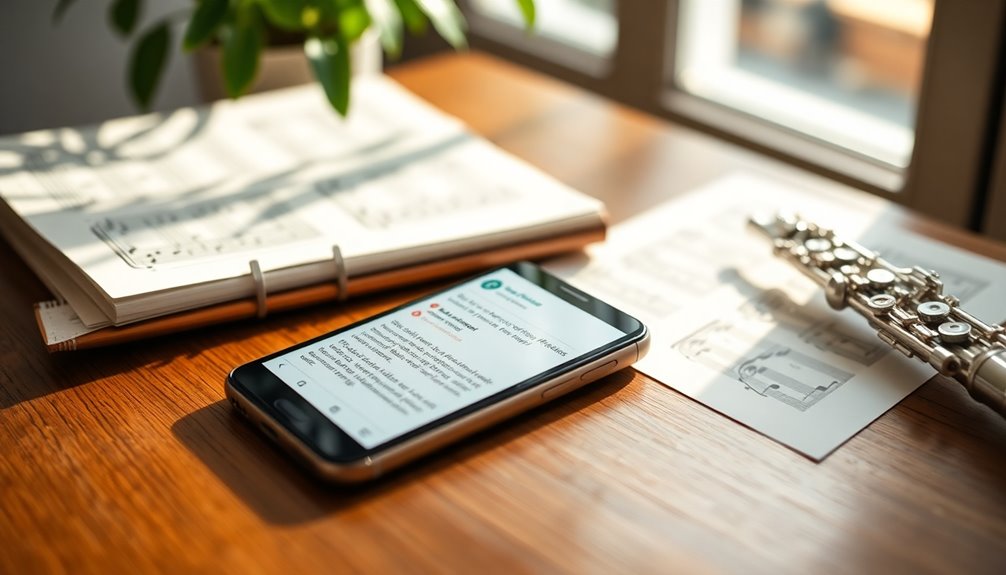
Finding the right flute teacher can sometimes feel overwhelming, but reading reviews and testimonials can simplify the process. By diving into flute reviews, you get a glimpse of other students' experiences, helping you gauge what to expect.
Look for common themes in the feedback—do students appreciate the teacher's patience, creativity, or ability to make lessons enjoyable? These insights can guide your decision.
Teacher testimonials are equally valuable. They often highlight a teacher's strengths, teaching style, and their commitment to student growth. A teacher who consistently receives positive testimonials may be someone you want to evaluate.
Pay attention to the specifics: do former students mention significant progress or a newfound love for the flute? Additionally, consider seeking recommendations from local music forums where student musicians often share their experiences.
Don't forget to check multiple sources for a well-rounded perspective. Websites, social media, and local music forums can all provide different angles.
Attend Local Music Events

Immersing yourself in the local music scene can be a fantastic way to discover a great flute teacher. By attending music events, you'll not only enjoy beautiful performances but also open doors for music networking that can lead you to talented instructors.
Here are some ways to leverage local music events:
- Meet musicians who share your interest in the flute.
- Connect with instructors who may be performing or attending.
- Engage in community outreach programs that often feature local teachers.
- Participate in workshops or masterclasses that showcase flute skills.
When you're part of the community, you gain insights into the teaching styles and philosophies of various musicians. Additionally, being involved in local events allows you to experience the harmonious blend of unique tones that creates rich musical experiences, which can help you identify teaching approaches that resonate with you.
Look for opportunities to chat with performers after their shows; they might've recommendations for flute teachers who resonate with your goals.
Plus, attending events can help you feel more connected to others who share your passion for music.
Schedule Trial Lessons
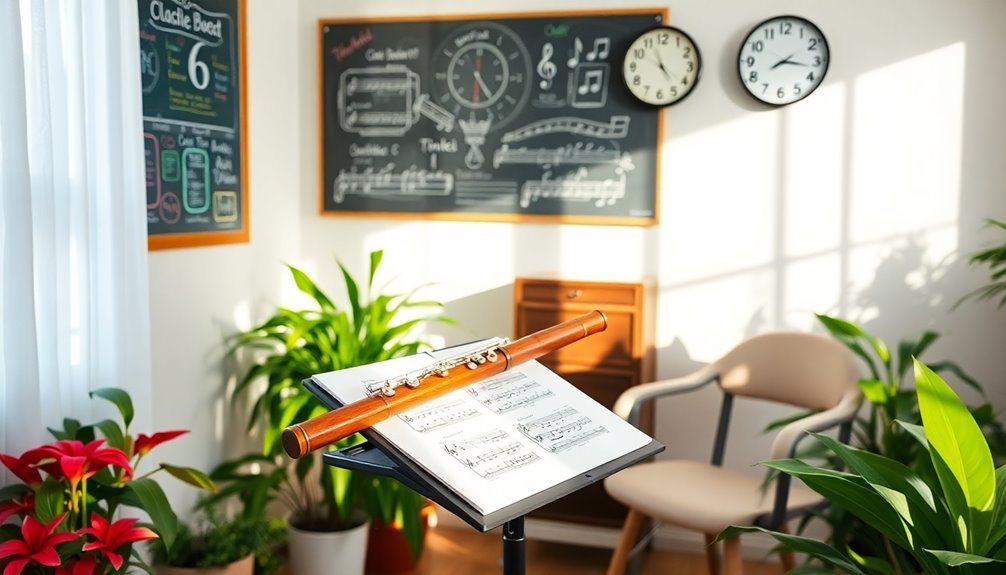
Connecting with local musicians and attending events can help you discover potential flute teachers, but the next step is to schedule trial lessons with them.
Trial lessons offer numerous benefits, giving you a chance to assess the teacher's approach, communication style, and overall vibe. You'll want to come prepared, knowing what to expect during these sessions.
Typically, a trial lesson may consist of a short introduction, followed by a focus on your current skill level and specific goals. This is your opportunity to discuss what you hope to achieve, whether it's mastering a particular piece or improving your technique.
Don't hesitate to ask questions about their teaching methods or experience. It's important to feel comfortable and connected, as a positive relationship can greatly enhance your learning experience. Additionally, understanding their familiarity with different flute types and key features can provide valuable insights into your learning process, especially as you consider key considerations for choosing a flute.
After the trial lesson, reflect on how well the teacher met your expectations and whether you felt supported in your journey.
Evaluate Teaching Styles
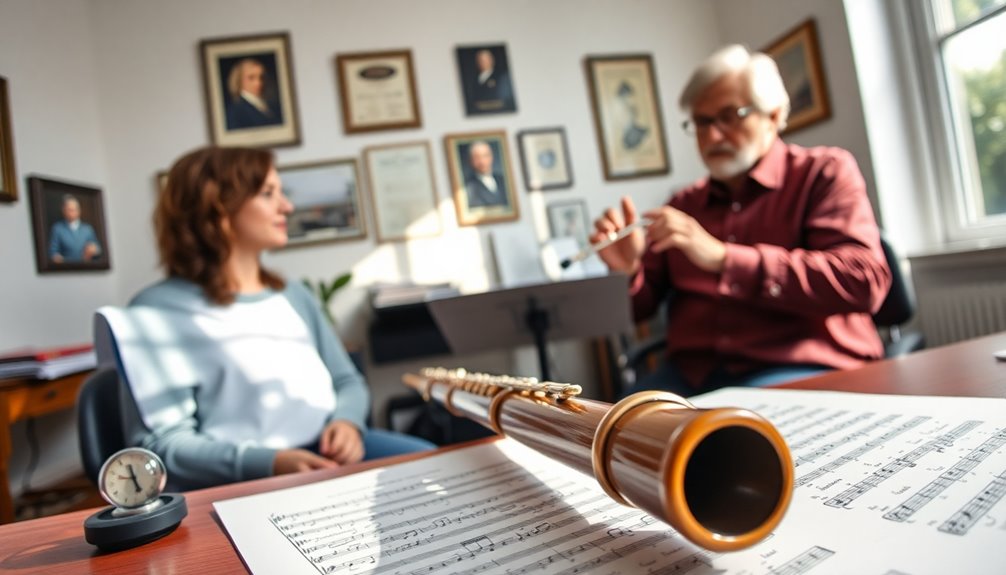
When evaluating a flute teacher's style, it's crucial to take into account how their methods align with your learning preferences. Each teacher has a unique teaching philosophy that can influence your growth as a musician.
Consider these aspects to gauge their approach to student engagement:
- Communication Style: Do they explain concepts clearly and patiently?
- Feedback Mechanism: Are they encouraging and constructive in their critiques?
- Lesson Structure: Is the curriculum flexible and tailored to your needs?
- Motivation Techniques: Do they inspire you to practice and explore?
Understanding a teacher's philosophy helps you identify if their style resonates with you. You want someone who not only instructs but also engages you in the learning process. Additionally, consider how they incorporate consistent practice schedules into their teaching to promote skill retention.
Ask potential teachers about their approach to teaching and how they keep students motivated. It's crucial that you feel excited and supported as you learn the flute.
Finding a teacher whose style complements your learning preferences can make all the difference in your musical journey. Remember, the right teacher can help you thrive and feel like you truly belong in the world of music!
Discuss Pricing and Availability
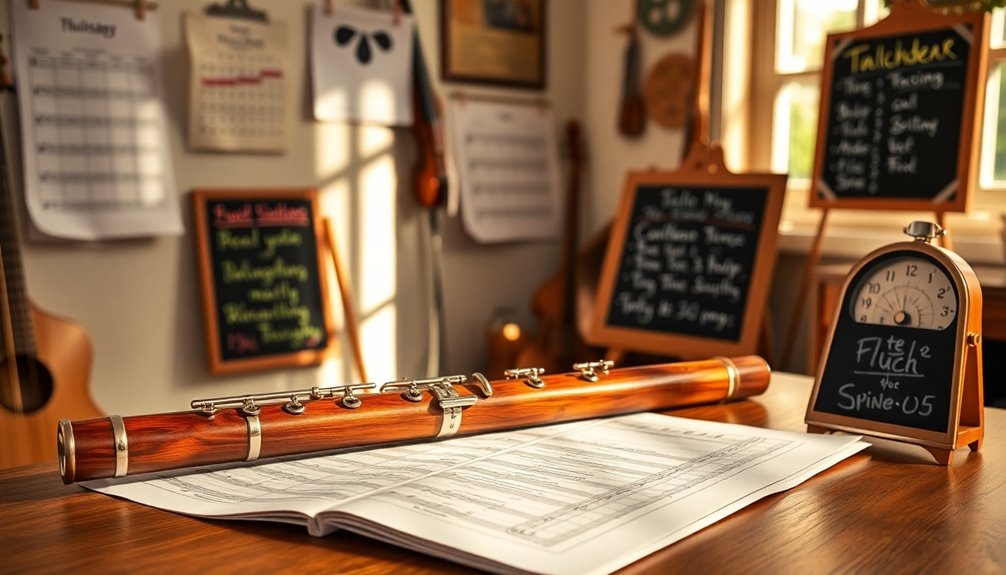
Finding the right flute teacher involves not just evaluating their teaching style, but also considering their pricing and availability. It's crucial to find a teacher whose pricing options align with your budget while also fitting into your schedule.
When discussing lesson frequency, ask potential teachers about their recommended lesson plans. Some may offer weekly sessions, while others might suggest bi-weekly or monthly lessons. Understanding the commitment can help you make an informed choice.
Here's a quick comparison of typical pricing options and lesson frequencies:
| Pricing Options | Lesson Frequency |
|---|---|
| $30 – $50 per hour | Weekly (1 hour) |
| $25 – $40 per hour | Bi-weekly (1 hour) |
| $50 – $70 per hour | Weekly (30 min) |
| $20 – $35 per hour | Monthly (1 hour) |
Consider your own goals and how often you want to practice. The right balance of pricing and lesson frequency will help you stay motivated and guarantee a fulfilling learning experience. Additionally, selecting a teacher who has experience with beginner flute brands can enhance your learning process. Reaching out to a few teachers can give you a clearer picture. You'll feel more confident in your choice knowing you've done your homework!
Frequently Asked Questions
What Age Is Appropriate to Start Learning the Flute?
If you're wondering about the right age to start learning the flute, consider the beginner age range of around 7 to 9 years old.
At this stage, kids often show flute readiness signs like an interest in music and the ability to hold the instrument properly.
However, every child is unique, so pay attention to their enthusiasm and physical readiness.
Starting early can foster a lifelong love for music and create a sense of belonging in a musical community.
How Long Does It Typically Take to Learn the Flute?
Imagine you're in a 1980s music video, grooving with your flute!
Learning the flute usually takes several months to a few years, depending on your practice duration and learning pace. If you dedicate regular practice, you'll progress faster.
Everyone's journey's unique, so don't compare yourself to others. Embrace the process, and enjoy making music!
Connect with fellow flutists to share tips and keep the motivation alive—it makes the experience even more rewarding!
What Materials or Equipment Do I Need for Lessons?
To get started with your flute lessons, you'll need a few essential accessories. A quality flute is a must, but don't forget about flute maintenance tools, like a cleaning rod and cloth.
A metronome can help you keep time, while sheet music or a lesson book will guide your practice. Consider a case for protection, too.
With these items, you'll feel prepared and ready to immerse yourself in your musical journey!
Can I Switch Teachers if I'm Not Satisfied?
Absolutely, you can switch teachers if you're not satisfied.
It's crucial to prioritize teacher compatibility and guarantee your lesson expectations are being met.
If you feel your learning style isn't aligning with your current teacher, don't hesitate to explore other options.
Finding someone who understands your goals and fosters a supportive environment can make all the difference in your musical journey.
Are Group Lessons as Effective as Private Lessons?
When it comes to music lessons, you might feel like you're caught between a rock and a hard place.
Group lessons can foster strong group dynamics, enhancing motivation and camaraderie. However, private lessons often offer tailored feedback, which can boost lesson effectiveness.
It really depends on your learning style and what you value more: the shared experience or personalized attention.
Either way, you'll find a supportive environment that helps you grow.
Conclusion
Finding a great flute teacher is like discovering a hidden gem in your neighborhood. By clarifying your goals, exploring local options, and considering online resources, you'll uncover the right fit for your musical journey. Don't forget to check credentials and read reviews to guarantee quality. Once you've found a few candidates, trial lessons can be the perfect way to gauge compatibility. With patience and persistence, you'll be playing beautiful melodies in no time!






